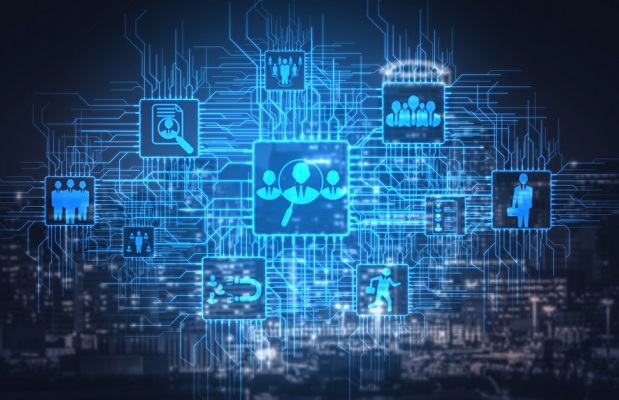 "The hybrid workplace environment has led to a whole new set of skills that employees need to learn," says NovoEd's Todd Moran. (Image: Shutterstock)
"The hybrid workplace environment has led to a whole new set of skills that employees need to learn," says NovoEd's Todd Moran. (Image: Shutterstock)
Despite all of the benefits of working from home, many employees, especially those just starting out their career, have at least one major concern: the lack of opportunities to network and advance their careers.
Indeed, in a virtual environment, many of the professional relationships that would evolve naturally through regular in-office interactions just don't happen. Even companies' intentional mentorship programs have taken a hit over the past year.
 Todd Moran, chief learning strategist, NovoEd
Todd Moran, chief learning strategist, NovoEd Recommended For You
Given the current rate at which employees are leaving their employer to pursue new opportunities, creating strong workplace mentorship programs and establishing paths for career growth are even more imperative. Todd Moran, chief learning strategist with NovoEd recently shared some thoughts on how employers can redefine their mentorship programs for the new workplace.
What does the future of mentorship look like in a hybrid space?
As businesses embrace the hybrid workplace, mentorship programs must follow suit. Combining in-person communication with a variety of digital communication methods, like Slack or Microsoft Teams, can reduce Zoom fatigue and ensure that mentees get the right guidance and support at the right time. In a hybrid mentorship setup, mentors must take advantage of the time they spend with their mentees in-person to have constructive discussions and form connections, while also establishing open lines of communication and trust in remote settings through virtual coffee chats, accessible hours and a common goal for the mentorship program.
On the other hand, mentorships, where one or both parties are remote full-time, must consider the same central principles of finding ways to connect and earn each other's trust from the beginning. Varying levels of communication through chat services and video and welcoming digital spaces are essential to making fully digital mentorships function as effectively as their in-person or hybrid counterparts.
How can mentors and mentees connect when in a digital workspace, where casual interaction is rare?
While it's easier to have casual interactions in person, it is not impossible to do so in the digital workplace – it just requires more intention. Carving out five minutes on Monday morning to ask mentees how their weekend was or sending them a quick message with an interesting article or a funny gif are small, but purposeful, ways to build relationships through casual, digital interactions. By creating open, digital spaces that facilitate these informal interactions, mentors can form more meaningful relationships with their mentees, creating a solid foundation for feedback and guidance to take place. Establishing a comfortable rapport and deep level of trust between mentor and mentee ensures that the relationship will be successful and beneficial for both parties.
What have companies learned in the last year to improve their mentorship programs? What do they still have to learn?
Overall, employees have become more technologically savvy in the past year, enhancing their ability to communicate effectively in remote workplaces and learning how to cultivate relationships even when not meeting someone in person. With remote and hybrid work environments becoming the norm moving forward, companies must revamp mentorship programs to fit specifically into this new world of work and provide opportunities for asynchronous interactions to avoid fatigue from required face-to-face meetings.
The best mentorship programs are ones where both parties –– the mentor and the mentee –– learn alongside each other. When designing a mentorship program, businesses should focus on pairing mentors and mentees who can learn from one another together. For instance, a more senior manager can share advice on leadership style and future career path options to a more junior employee, while the junior worker can provide tips and tricks on navigating technology, social media and other new mediums so the more seasoned veteran can take advantage.
These peer-to-peer and even reverse mentorship opportunities can also be closely tied to DEI initiatives, as a way to be exposed to new perspectives, and can be incorporated in important learning initiatives, so that people can mentor each other in that safe context of learning a new skill together.
Organizations should also be thoughtful in the assignments, discussion prompts and materials provided in mentorship programs so they aren't solely one-way knowledge dissemination processes from mentor to mentee. For instance, hard skills and management discussions are well-tailored for mentees to learn from mentors, but weaving in technology workshops and discussions on work-life balance and mental health, for example, can allow senior employees and mentors to learn from their more junior mentees.
What skills do mentors need to provide guidance in this hybrid environment?
The hybrid workplace environment has led to a whole new set of skills that employees need to learn. Communicating effectively via digital workplace tools, shepherding teams through uncertainty and practicing resilience to weather crises have all become essential skills in the current hybrid workforce. As a result of these massive shifts in the way we work, mentors need to provide effective guidance to their mentees around how they can develop and excel in these new, but crucial, capabilities.
For example, mentors can share first-hand experiences on what worked best for them when getting acclimated using Slack or Zoom and can even offer a tutorial on how to navigate a new technology tool so the mentee is able to learn visually. These softer skills are best translated to newer employees when seasoned veterans lead by example, and mentors are in a unique position to pass on these skills, along with their years of wisdom, to mentees due to the nature of their relationships.
Why is it important to involve mentors and coaches into employees' learning and development plans?
Worldwide, 85% of employees are either not engaged or actively disengaged at work. Engagement can be improved by one-on-one mentoring relationships and properly implemented, specifically tailored learning development programs. Mentors and coaches also provide employees with a window into future career paths, which enhances learning and development plans by giving workers a better idea of the types of experiences they want to gain in the future.
By involving mentors and coaches in an employee's learning and development plan, employees have a resource they can turn to that allows them to further build on the skills they are learning, allowing them to more deeply understand and apply their newfound knowledge and capabilities to existing relationships, conversations and work.
© Touchpoint Markets, All Rights Reserved. Request academic re-use from www.copyright.com. All other uses, submit a request to [email protected]. For more inforrmation visit Asset & Logo Licensing.







